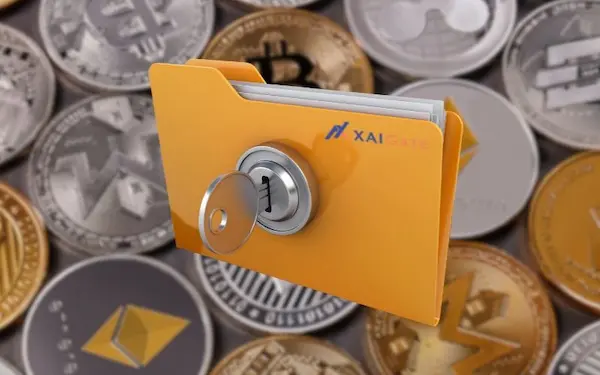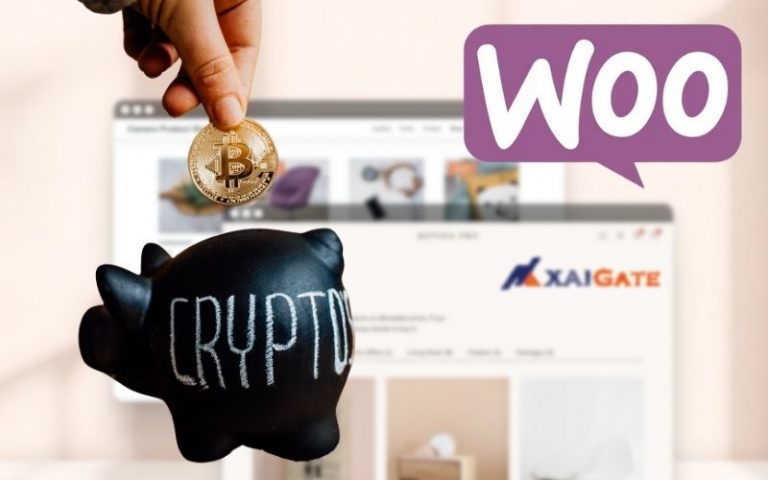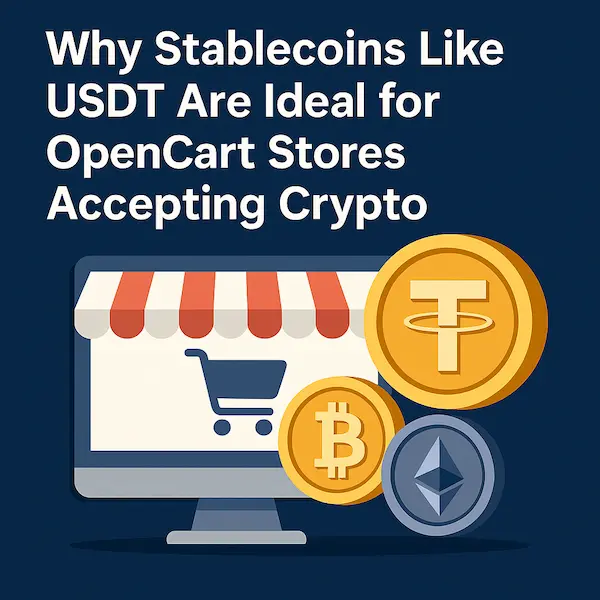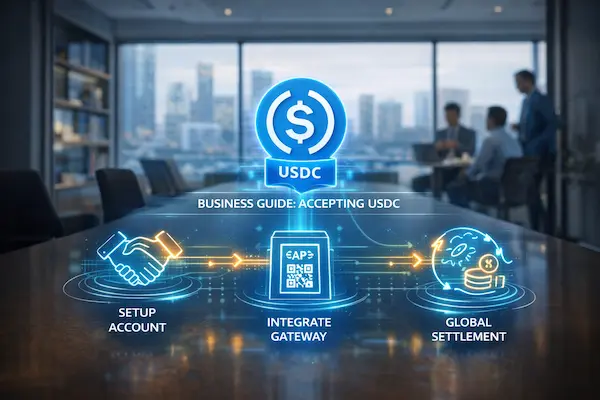Everyone usually loves using a dark web Bitcoin wallet because of its privacy. Specifically, it allows you to send and receive Bitcoin without linking the real-world identities: no names, no addresses, just a string of code moving through the blockchain. However, it also comes with big risks such as scams, hacks, and legal troubles. In this article, we will provide you with solutions and a great alternative – XAIGATE.
Contents
- 1 Why is the dark web Bitcoin wallet so appealing to users?
- 2 Risks of using dark web Bitcoin wallet
- 3 Mandatory OpSec rules when using wallets on the dark web
- 4 Legal alternative solutions for dark web Bitcoin wallet – XAIGATE
- 5 Advanced Security Practices to Protect Bitcoin Wallets in Today’s Climate
- 6 FAQs
- 7 Securing Crypto in 2026 — From Dark Web Risks to Legal Resilience
Why is the dark web Bitcoin wallet so appealing to users?
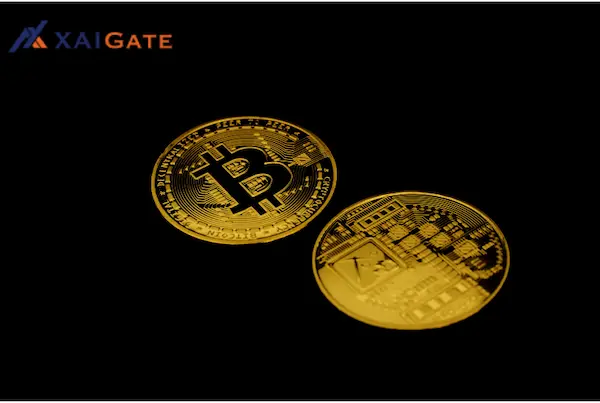
Have you ever wondered why Bitcoin wallets are the go-to choice on the dark web? It’s all about near-anonymous transactions, widespread acceptance, and user-friendly features that Bitcoin offers.
Near-perfect anonymity (or so it seems)
Bitcoin transactions don’t require personal details like your name or address, making them a favorite for those seeking privacy on the dark web. Moreover, many users believe Bitcoin is hard to trace, especially when using tools like Bitcoin mixers, which shuffle your coins with others to obscure their origin and destination.
Bitcoin’s widespread popularity
Bitcoin is the most widely accepted cryptocurrency on the dark web, used everywhere from dark markets to anonymous services. Vendors prefer this type of crypto because it’s easy to use and fast to allow transactions without the hassle of converting to other currencies.
Easy setup and use
Dark web Bitcoin wallets are designed for simplicity, often requiring no KYC (Know Your Customer) verification and accessible via Tor browsers. Like Chrome and Firefox, Tor is a browser which is built to protect your privacy. When using Tor, your online activity is hidden, so no one can see what websites you are visiting. Tor is one of the useful ways to access special websites called .onion sites which you can’t find on Google.
To get started, you just need to download the Tor browser (it’s free), create a Bitcoin wallet on the dark web, load it with Bitcoin and start trading on .onion sites. Here is a list of dark web wallets:
- http://y22arit74fqnnc2pbieq3wqqvkfub6gnlegx3cl6thclos4f7ya7rvad.onion/ Dark Mixer
- http://hqfld5smkr4b4xrjcco7zotvoqhuuoehjdvoin755iytmpk4sm7cbwad.onion/ Mixabit
- http://p2qzxkca42e3wccvqgby7jrcbzlf6g7pnkvybnau4szl5ykdydzmvbid.onion/ Onion Wallet
- http://mp3fpv6xbrwka4skqliiifoizghfbjy5uyu77wwnfruwub5s4hly2oid.onion/ EasyCoin Wallet
- http://ovai7wvp4yj6jl3wbzihypbq657vpape7lggrlah4pl34utwjrpetwid.onion/ Virgin Bitcoins
Risks of using dark web Bitcoin wallet
Using a dark web Bitcoin wallet can feel like a gateway to ultimate privacy but it’s not without serious dangers. From scams to legal troubles, here are the critical risks you need to know to protect your funds and stay safe:
Scams and fake wallets

Many dark web Bitcoin wallets are traps set by scammers. According to Chainalysis’ 2024 Crypto Crime Report, scams on dark web platforms accounted for over $9.9 billion in illicit revenue. Fake wallets are a common tactic. Specifically, these fraudulent wallets often steal your private keys or vanish after you deposit funds.
Malware and hacks

Dark web wallets are prime targets for malware, such as “wallet drainers” that secretly siphon your Bitcoin. SecurityWeek reported in 2024 that wallet-draining malware stole nearly $500 million from over 332,000 crypto addresses.
Downloading a Bitcoin wallet from an unverified .onion site on the dark web can install dangerous software like keyloggers, which secretly record your passwords, or ransomware, which locks your device until you pay a ransom. To stay safe, choose an open-source wallet like Wasabi Wallet, which uses CoinJoin to keep your transactions private and has transparent code verified by the community.
Legal and regulatory scrutiny
The promise of anonymity with dark web wallets comes with a catch—regulators are watching. Bitcoin’s blockchain is public and tools like Chainalysis’ Reactor software can trace transactions, even those mixed through services like YoMix.
Using these wallets for unlawful purposes (e.g., buying restricted goods) can lead to severe legal consequences, including fines or imprisonment. For example, the U.S. Department of Justice (DOJ) seized 69,370 Bitcoin, valued at approximately $1 billion in November 2020, from a Bitcoin wallet linked to Silk Road, a notorious darknet marketplace shut down in 2013. This was the largest cryptocurrency seizure in DOJ history at the time, occurring on November 3, 2020. Even legitimate users risk being flagged if their transactions are linked to suspicious addresses.
Technical Complexity
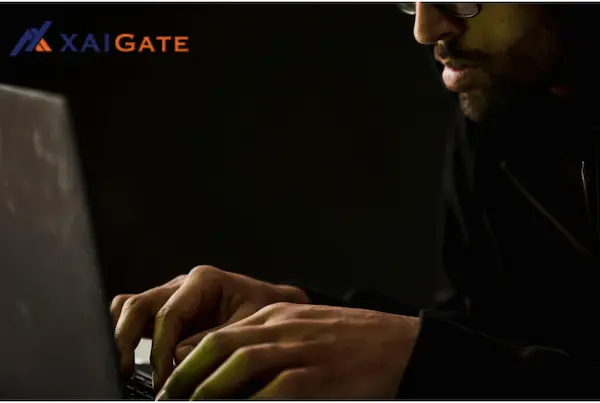
Managing a dark web wallet requires expertise in setting up Tor, managing private keys and avoiding phishing sites. One wrong move, like reusing a Bitcoin address or connecting to a compromised Tor node, can expose your identity or funds.
Comparison Table: Dark Web Bitcoin Wallet vs. Regulation-Compliant Gateway (2026)
| Feature | Dark Web Bitcoin Wallet | Regulation-Compliant Gateway |
|---|---|---|
| Privacy | High, but vulnerable to blockchain forensics | High, with legal safeguards |
| Legality | Risk of violating national/international laws | Fully compliant with AML/KYC regulations |
| Security | Depends on user’s OpSec skills | Enterprise-grade, multi-layer security |
| Accessibility | Requires Tor, technical setup | Easy access via web/app |
| Risk of Scam | High — phishing, fake wallets common | Very low, regulated environment |
| Support | None or anonymous forums | 24/7 verified customer support |
| Transaction Speed | Varies, often slower due to network routing | Optimized for instant or near-instant processing |
| Best For | Highly skilled, risk-tolerant users | Privacy-conscious users who value safety and compliance |
Mandatory OpSec rules when using wallets on the dark web
The dark web is a high-risk environment, especially when using Bitcoin wallets for transactions. To protect your funds and maintain anonymity, following operational security (OpSec) rules is non-negotiable. Here’s a clear, beginner-friendly guide to safely using Bitcoin wallets on the dark web with specific risk warnings.
Choose a trustworthy wallet
Not all wallets are safe. Wallets from unknown sources may contain malware that steals your private keys or seed phrases. To be safe, you should use open-source, community-verified wallets such as Electrum or Wasabi Wallet or download wallets from official websites like electrum.org via the Tor network for anonymity. Don’t forget to verify the installation file’s PGP signature to ensure authenticity. If not, fake wallets can send your data to hackers or steal your Bitcoin entirely.
Never reuse Bitcoin addresses
Each Bitcoin address should be used only once. Reusing addresses makes your transactions traceable, compromising anonymity. Thus, it’s best for you to use wallets that generate new addresses for each transaction. And remember to double-check the recipient’s address before sending as malware can swap addresses in your clipboard. If you ignore this rule, hackers or law enforcement can link your transactions, exposing your identity.
Use mixers carefully
Bitcoin mixers obscure the origin of transactions, enhancing anonymity. However, not all mixers are trustworthy, especially mixers requesting personal information or logging transaction data. Instead, let’s choose decentralized mixers or services with good reputation on dark web forums.
If you ignore it, scam mixers may keep your funds or send “tainted” Bitcoin (linked to illegal activity), causing legal issues.
Secure your device and connection
The dark web is a hotspot for malware and scams. An unsecured device can lead to total loss of funds. To be safe, you should use a secure operating system like Tails OS or Whonix to access the dark web, avoid installing software or clicking links from unverified dark web sources. Also, you should always use Tor Browser and verify .onion URLs to avoid phishing.
Without being careful, keyloggers or trojans can capture your seed phrase or private keys.
Store your seed phrase safely
Your seed phrase is the “master key” to recover your wallet. If you lose or expose it, your funds will be gone. To avoid hacking, malware, or phishing attacks, it’s better to write your seed phrase on paper, then store it in a secure place instead of an internet-connected device. In case you want to enhance security, consider using a hardware wallet like Ledger or Trezor.
Ignoring it can help hackers restore your wallet from a leaked seed phrase and drain your funds instantly.
Spot scams and phishing
The dark web is rife with scams from fake wallets to shady exchanges. So, let’s ignore “easy money” and “free Bitcoin” offers or at least check reviews on trusted dark web forums before using a service. Before using, you also need to verify.onion addresses for wallets or services through multiple sources. If not, you could send funds to scammers or download malware disguised as a wallet.
If you want to maintain privacy across your entire crypto stack—not just your wallet—consider using a no-KYC crypto payment gateway that aligns with decentralized principles.
Legal alternative solutions for dark web Bitcoin wallet – XAIGATE
Are you looking to integrate crypto payments into your e-commerce website? Are you thinking about the dark web Bitcoin wallet but concerned about the legality and risks? No worries—XaiGate.com is the legal, secure, and user-friendly alternative to handle crypto transactions transparently and professionally.
We are a global crypto payment gateway designed to help businesses of all sizes easily accept payments in popular cryptocurrencies like Bitcoin, Ethereum, Tether, Dogecoin, and more. With XaiGate, you can avoid the legal and technical risks associated with Dark Web wallets. Check the comparison table below to know why you should choose dark web wallets vs XAIGATE:
| Criteria | Dark web wallets | XAIGATE |
| Legality | Illegal, prone to violating international laws | Legal, compliant with international regulations |
| Transparency | Anonymous, hard to trace, lacks transparency | Transparent, transactions recorded on blockchain |
| Security | High risk of hacks, depends on platform | High security, uses blockchain technology |
| Ease of use | Complex, requires technical knowledge | Easy to integrate with websites, clear guides |
| Cryptocurrency support | Limited, mainly Bitcoin or Monero | Supports over 9.866 cryptocurrencies |
| Transaction fees | Low but unstable, may include hidden fees | Competitive, transparent, no hidden fees |
| Customer support | None or very limited | 24/7 support, detailed FAQ resources |
| Website Integration | No easy integration support | Integrates with WordPress Shopify, WooCommerce |
Using a dark web Bitcoin wallet offers unparalleled privacy, but it’s a high-risk game. Thus, to be safe, you should apply Mandatory OpSec rules or use alternative – XAIGATE.
Advanced Security Practices to Protect Bitcoin Wallets in Today’s Climate
As threats evolve, securing a dark web Bitcoin wallet requires more than just basic hygiene. In 2026, the best protection comes from combining strong cryptographic tools with proactive user behavior. Staying updated on new scams is as important as the wallet itself.
1. Cold Wallet Adoption on the Rise
Industry analysts report a 40% increase in users shifting Bitcoin to hardware or cold wallets in the past year, highlighting the growing distrust of always-online storage.
2. Multi-Signature Security for High-Value Funds
Advanced users and darknet vendors are increasingly using multi-signature wallets, which require several private keys for authorization. This makes theft far more difficult.
3. Regular Address Rotation to Maintain Anonymity
Blockchain analysis firms are now capable of tracing reused addresses across multiple platforms. Rotating wallet addresses regularly helps maintain anonymity.
4. Vendor Verification Before Transactions
In response to a wave of exit scams, many communities now maintain public “reputation boards” that track vendor credibility. Checking these sources before transferring Bitcoin has become essential.
5. Strengthening Device-Level Security
With malware targeting crypto wallets growing, experts recommend using a dedicated clean device for transactions, updated only with security patches and not used for general browsing.
| Security Measure (2026) | Why It Matters | Who Should Use It |
|---|---|---|
| Cold Wallet Storage | Prevents remote hacks, safest vault option | All users with long-term funds |
| Multi-Signature Wallets | Requires multiple keys, adds extra barrier | Vendors, high-value users |
| Address Rotation | Avoids blockchain tracking and deanonymization | Frequent traders |
| Vendor Reputation Checks | Reduces risk of scams and lost funds | Buyers & sellers on markets |
| Dedicated Secure Device | Minimizes malware exposure | Serious dark web participants |
FAQs
1. What is OpSec and why is it important when using a Bitcoin wallet on the dark web?
OpSec, short for Operational Security, is a set of practices to protect your identity and funds online. On the dark web, poor OpSec can expose your real-world identity or compromise your Bitcoin wallet.
2. What type of wallet should I use for better privacy on the dark web?
Choose open-source wallets that support Tor or CoinJoin, such as Wasabi Wallet or Electrum with Tor. These tools help obscure your IP and transaction history.
3. How can I verify if a .onion Bitcoin wallet site is legitimate?
Always cross-check the onion address from multiple trusted sources, verify PGP signatures if available, and avoid wallets with no user reputation or history.
4. Why is it risky to reuse Bitcoin addresses?
Reusing addresses links multiple transactions together, making it easier for anyone analyzing the blockchain to track your activity or connect wallets to you.
5. How do Bitcoin mixers work and are they really safe?
Mixers shuffle your coins with others to break transaction trails. While some are effective, you should only use mixers recommended by trusted privacy communities.
6. Should I use a VPN in addition to Tor for dark web access?
Yes, using a VPN before Tor (Tor over VPN) adds another layer of protection, especially if your internet provider monitors Tor connections.
7. Is it safer to store Bitcoin in a hardware wallet for dark web use?
Absolutely. Hardware wallets keep your private keys offline, protecting them from malware, keyloggers, or remote hacks on your system.
8. What can I do if I lose my wallet’s seed phrase?
Unfortunately, without the seed phrase or a backup, your Bitcoin is unrecoverable. Always store the phrase securely and offline.
9. Can law enforcement trace Bitcoin transactions on the dark web?
Yes. Agencies use blockchain analysis tools to follow transaction trails, even through mixers. Weak OpSec can lead to wallet deanonymization or asset seizure.
10. Can XAIGATE replace dark web wallets and offer better security?
XAIGATE provides legal, secure, and user-friendly crypto payments. While not anonymous, it offers a safer alternative for legitimate use, with full compliance and customer support.
Securing Crypto in 2026 — From Dark Web Risks to Legal Resilience
In 2026, the digital currency landscape is entering a decisive turning point. With global regulators — from the U.S. Department of Justice to the European Union’s AMLA — tightening compliance requirements and enhancing blockchain forensic capabilities, the era of “invisible” cryptocurrency transactions on the dark web is rapidly eroding. High-profile takedowns of darknet marketplaces in recent months, coupled with record seizures of illicit Bitcoin wallets, serve as a stark warning: relying solely on a dark web Bitcoin wallet is no longer the fortress of anonymity it once appeared to be.
While operational security (OpSec) remains a critical skill for anyone transacting online — from verifying wallet addresses to safeguarding private keys — it is no longer enough to guarantee safety in this evolving environment. Modern cybercriminal groups have adopted advanced phishing techniques, zero-day malware, and address-poisoning attacks, while investigative agencies leverage clustering algorithms, mempool analysis, and exchange KYC leaks to trace funds with unprecedented accuracy.
Against this backdrop, the smartest crypto users are pivoting toward regulation-compliant payment gateways that deliver enterprise-grade wallet protection, end-to-end encryption, and privacy-conscious architecture — all without crossing legal boundaries. These platforms balance confidentiality with compliance, ensuring that users maintain financial sovereignty while mitigating the legal, technical, and reputational risks associated with darknet transactions.
The choice in 2026 and beyond is not between privacy and legality — it’s between risk and resilience. By combining disciplined OpSec practices with secure, regulated payment infrastructure, individuals and organizations can protect their digital assets, stay ahead of tightening laws, and ensure their operations remain both private and defensible. In a world where cybercrime crackdowns are accelerating and blockchain analytics are closing the gap, security is no longer about hiding in the shadows — it’s about choosing the safest possible ground to stand on.
For daily updates, subscribe to XAIGATE’s blog!
We may also be found on GitHub, and X (@mxaigate)! Follow us!

